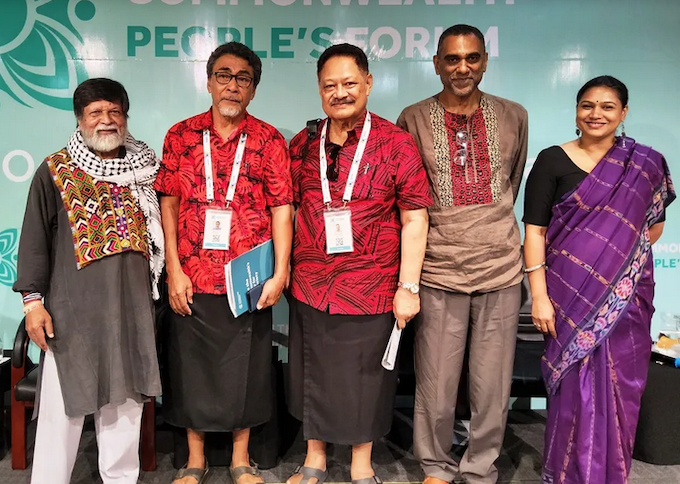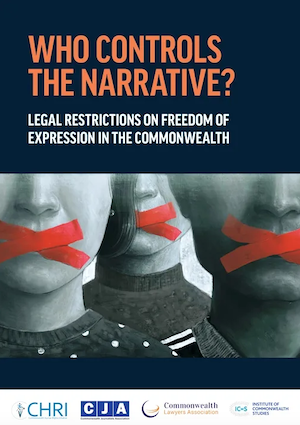
Talamua Media
The Commonwealth Heads of Government adopted the Commonwealth Principles on Freedom of Expression and the Role of the Media in Good Governance at their summit meeting in Apia, Samoa, last week.
These Principles highlight the importance of freedom of expression and media freedom to democracy. They state that Commonwealth governments “should consider repealing or amending laws which unduly restrict the right to freedom of expression”.
The Commonwealth Human Rights Initiative and the Commonwealth Journalists’ Association called on states to take practical and effective steps to end arbitrary and excessive restrictions on free expression. The Commonwealth as a whole must audit progress and engage with civil society to ensure that these Principles are implemented in reality.
- READ MORE: RSF tackles Taiwan’s media freedom ‘Achilles heel’, boosts Asia Pacific monitoring action
- Two of the US’s biggest newspapers have refused to endorse a presidential candidate. This is how democracy dies
- Commonwealth takes historic step towards protecting free speech
- Other CHOGM reports
Freedom of expression is not just a right in itself — it is the foundation that allows us to exercise and defend all other human rights, and is safeguarded under international law.
However, as we know all too well, this right is under threat.
According to UNESCO, in Commonwealth countries alone, 178 journalists were killed between 2006 and 2020. Furthermore, the impunity rate for the killings of journalists during that same time is 96 percent — which is notably higher than the global impunity rate of 87 percent.
Reporters Without Borders (RSF) has documented 547 journalists imprisoned globally as of the end of 2023, with legal harassment often used as a tool to stifle dissent and investigative reporting.
Restrictive, colonial-era laws
Many Commonwealth countries still maintain restrictive, colonial-era laws that curtail free expression, suppress diverse voices, and inhibit the transparency that is essential for democracy.
In the Commonwealth:
- 41 countries continue to criminalise defamation; 48 countries still retain laws related to sedition; and
- 37 still have blasphemy or blasphemy-like laws.

These details are set out in a soon to be released report by the Commonwealth Human Rights Initiative (CHRI) and the Commonwealth Journalists Association (CJA), with other Commonwealth partners, entitled Who Controls the Narrative? Legal Restrictions on Freedom of Expression in the Commonwealth.
“These laws, often enforced through criminal sanctions, have a chilling effect on activists, journalists, iand others who fear retaliation for speaking truth to power”, said William Horsley of the Commonwealth Journalists Association.
“This has led to an alarming rise in self-censorship and a decline in the independent and dissenting voices that are vital for holding governments accountable.”
Civil society response
The Principles were first put forward by a group of civil society organisations in response to a general deterioration in legal protections and the working environment for journalists.
The CJA convened other civil society organisations, including the CHRI, Commonwealth Lawyers Association and the Institute of Commonwealth Studies, before Commonwealth member states reviewed and adopted the Principles in the form which was adopted by heads of government at the 2024 CHOGM.
States are “urged to take concrete and meaningful steps to implement them within their domestic frameworks, as set out in the CHOGM Samoa Communiqué“.
The joint report Who Controls the Narrative? Legal Restrictions on Freedom of Expression in the Commonwealth reveals the increasing use of criminal law provisions, including those related to defamation, sedition, blasphemy, and national security, to restrict freedom of expression and media freedom within the Commonwealth.
The report is the product of extensive collaboration between Commonwealth partners, legal experts, academics, human rights advocates, and media professionals, and provides a comprehensive analysis of the legal frameworks governing freedom of expression and outlines clear pathways for reform.
In addition to analysing legal restrictions on free speech in Commonwealth states, the report puts forward actionable recommendations for reform.
These include regional and national-level proposals, as well as broader Commonwealth-wide recommendations aimed at strengthening legal frameworks, promoting judicial independence, encouraging media pluralism, and enhancing international accountability mechanisms.
#Commonwealth Heads of Government (#CHOGM2024) adopted the Commonwealth Principles on Freedom of Expression and the Role of the Media in Good Governance at their summit meeting in Apia, #Samoa🇼🇸.
https://t.co/HP9Lr1Aire— Oliver T. Mhuriro (@Oliver_Mhuriro) October 27, 2024
Reforms essential
These reforms are essential for establishing an environment where free expression can thrive, allowing individuals to speak without fear of reprisal.
“While many member states share a colonial legal legacy that includes repressive laws still in effect today, they also share a commitment to democratic governance and the rule of law as set out in the Commonwealth Charter,” said Sneh Aurora, director of the Commonwealth Human Rights Initiative.
“The Commonwealth has the potential to lead by example in promoting freedom of expression through legal reform, ensuring that criminal laws are not misused to silence dissent.
“The Principles provide an important opportunity for Commonwealth governments to bring their national laws in line with international human rights laws.”
Republished with permission from Talamua Online.












































